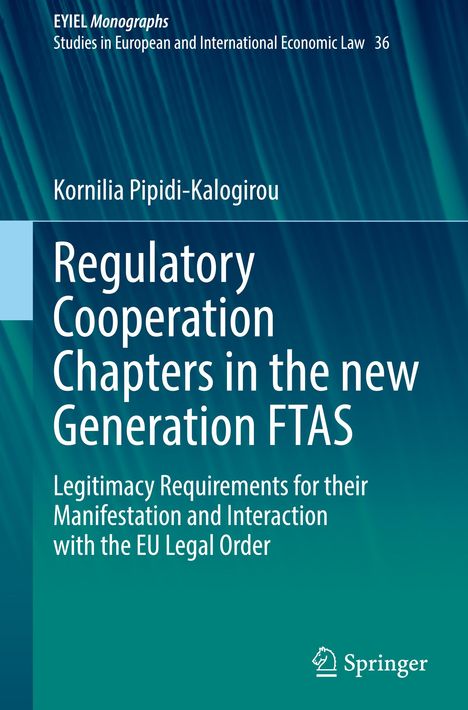Kornilia Pipidi-Kalogirou: Regulatory Cooperation Chapters in the new Generation FTAS, Gebunden
Regulatory Cooperation Chapters in the new Generation FTAS
- Legitimacy Requirements for their Manifestation and Interaction with the EU Legal Order
(soweit verfügbar beim Lieferanten)
- Verlag:
- Springer, 10/2024
- Einband:
- Gebunden, HC runder Rücken kaschiert
- Sprache:
- Englisch
- ISBN-13:
- 9783031718991
- Artikelnummer:
- 12044174
- Umfang:
- 252 Seiten
- Gewicht:
- 547 g
- Maße:
- 241 x 160 mm
- Stärke:
- 20 mm
- Erscheinungstermin:
- 26.10.2024
- Hinweis
-
Achtung: Artikel ist nicht in deutscher Sprache!
Weitere Ausgaben von Regulatory Cooperation Chapters in the new Generation FTAS |
Preis |
|---|---|
| Buch, Kartoniert / Broschiert, Englisch | EUR 153,32* |
Klappentext
Dive into the intricate world of international trade with this original analysis of Regulatory Cooperation Chapters in Free Trade Agreements (FTAs). This book meticulously examines for the first time the content, legal nature, and implications of these chapters within the European Union (EU) legal framework.
Narrowing its focus to the Comprehensive Economic and Trade Agreement (CETA) and the EU-Japan Economic Partnership Agreement ( EU-Japan EPA), chosen for their advanced Regulatory Cooperation provisions, the book proceeds to a rich analysis and comparison of the enshrined provisions.
The book delves into the political and legal landscape that necessitated this shift towards bilateral regulatory cooperation. It explains the strategic pivot from the stalled WTO negotiations to bilateralism, highlighting the inadequacies of existing WTO rules on non-tariff barriers. This analysis prompts the question: what has changed? Using the concept of ¿Legalization¿ as developed in political sciences, this interdisciplinary perspective reveals the increasing legalization and binding nature of these commitments, challenging the initial skepticism about their normative value.
The book further tracks the practical implementation of Regulatory Cooperation, using developments from CETA and EU-Japan EPA. It presents the two manifestation mechanisms of the Regulatory Cooperation in the EU legal order and highlights their roles in shaping EU's internal regulations. In that regard, the book challenges the legitimacy of these regulatory practices, assessing them through the lenses of input, output, and throughput legitimacy. With a view to maintain the rule of law and democratic principles, the author makes various proposals in that regard, from updated legal tools and model rules to a framework for EU Commission¿s decision-making capacity.
This book offers invaluable insights for policymakers, legal scholars, and trade professionals, providing a thorough understanding of the complex dynamics of Regulatory Cooperation in modern FTAs and their crucial role in shaping global trade relations.


